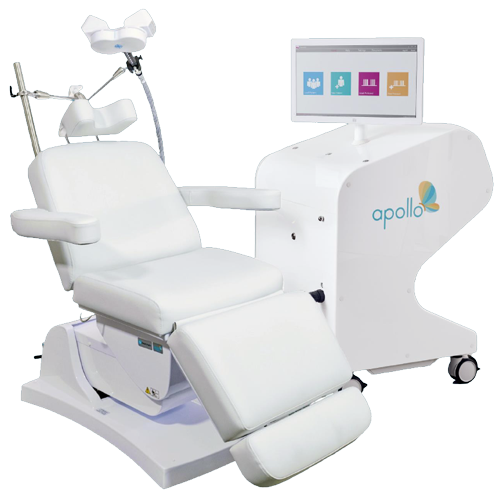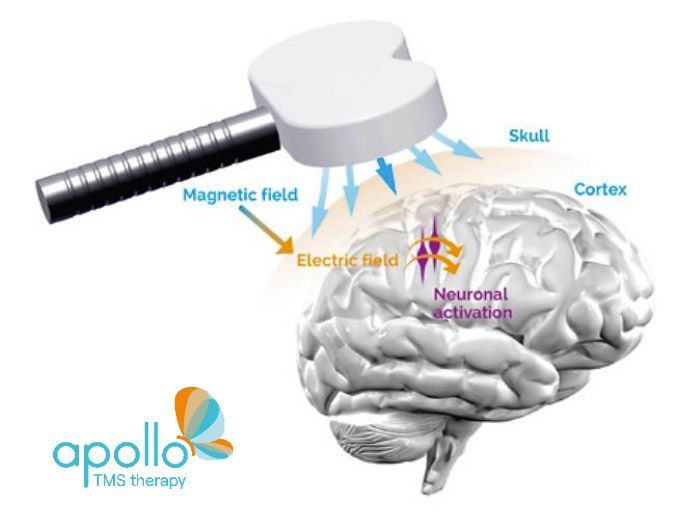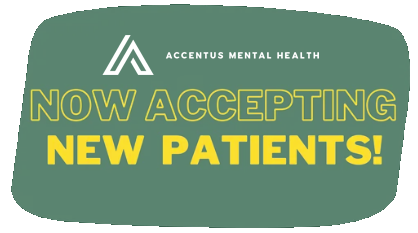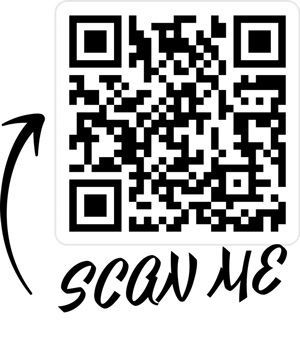ACCENTUS MENTAL HEALTH PROVIDES TMS THERAPY FOR INDIANAPOLIS
TMS therapy is the most advanced, non-invasive, FDA-approved therapy for the treatment of major depressive disorder (MDD) and obsessive compulsive disorder (OCD) when medications have not been effective in relieving symptoms. At present, TMS is covered by most insurance plans for adult patients with major depressive disorder who have tried traditional forms of treatment, such as antidepressant medications and therapy, yet continue to experience a poor quality of life.
Transcranial Magnetic Stimulation has revolutionized the field of psychiatric and neurological medicine. TMS is a technology that involves a series of repetitive, brief, and targeted magnetic pulses that work to stimulate brain cells.
The best part? TMS therapy for depression is a simple outpatient procedure.
DEPRESSION
ButtonA safe and virtually painless depression treatment without side effects.
While numerous clinical trials around the world continue to discover the benefits and uses of transcranial magnetic stimulation (TMS), at present, this life-giving therapy is FDA-approved to treat those suffering from depression and obsessive compulsive disorder (OCD). However, there is a significant amount of research that indicates efficacy for other conditions, such as anxiety, OCD, PTSD, smoking cessation, insomnia or sleep disorders, and other issues.
TMS has a plethora of advantages. Depression symptoms such as hopelessness, tiredness, irritability, sleeplessness, hunger changes, lack of motivation and interest in things all tend to disappear after TMS - offering long-term symptom relief and depression remission. Our TMS therapy system is a safe and effective treatment for Major Depressive Disorder (MDD) and can also be used to treat a variety of other mental and neurological issues. Ready to learn about TMS? We can help!
Looking for TMS therapy for MDD and are located in or near Indianapolis? We can help!
NAVIGATION LINKS
FREE CONSULTATION
Experiencing depression or a neurological disorder? Remember, you are not alone. Get help with your suffering today!

TMS THERAPY CAN HELP WITH:
- Depression
- Lack of Joy
- Sadness and Despair
- Low Mood
- Lethargy
- Insomnia
- Oversleeping
- Social Isolation
- Self-Harm
- Substance Abuse
- Suicidal Ideation
- Alcoholism
What are the potential benefits of TMS therapy vs. other depression treatments?
TMS is a non-invasive, non-drug treatment that is both safe and effective. TMS does not cause unwanted systemic side effects such as weight gain, sleeping difficulties, or sexual dysfunction, and patients can resume their regular routines following treatment. TMS therapy does not produce the same debilitating side effects as electro-convulsive therapy (ECT), such as memory loss, muscular spasms or pains, delirium, or short-term psychosis. In truth, the only negative effect of TMS reported by patients has been in discomfort at the treatment site or a possible headache that generally goes away after multiple treatments.

IS TMS THERAPY COVERED BY INSURANCE OR MEDICARE?
When medicines and psychotherapy have failed to help, TMS is generally covered by most major insurance plans for the treatment of moderate to severe major depressive disorder. While TMS therapy is FDA-approved for obsessive compulsive disorder (OCD), it isn't yet covered by all insurance carriers.
TMS therapy is also frequently utilized off-label, which means that doctors can prescribe TMS for purposes not yet approved by the FDA. When treated for a problem other than depression or obsessive compulsive disorder, TMS therapy treatment may be ineligible for coverage by insurance. Contact Accentus Mental Health right now to see whether your medical insurance will cover your treatment.
The TMS Magnetic Field is Similar to an MRI
Our Apollo TMS system provides a high performance stimulation coil for targeted stimulation. Some people compare the TMS treatment to getting an MRI. Instead of lying down, our Apollo TMS chair provides comfortable seating during your TMS treatment session.
- We position the magnetic coil on your head and target a specific area of your brain that is associated to depressive symptoms.
- The coil then emits a light stimulation process aimed at this specific area with a tapping sensation.
- This magnetic stimulation encourages your brain cells to naturally release chemicals that are necessary in order to regulate mood.
TMS THERAPY COMMON CONDITIONS TREATED
Have you been wondering if TMS therapy can help you with your unique demands? Take a look at the following common problems and how TMS treatment may assist in your emotional well-being.

DRUG & ALCOHOL ADDICTION
Drugs and alcohol are extremely dangerous chemicals that harm both mental and physical health. They also have a propensity to destroy families and relationships. If you or someone you care about is battling an addiction, TMS therapy can provide long-term, drug-free relief from urges.
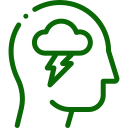
ADULT DEPRESSION TREATMENT
The FDA has approved transcranial magnetic stimulation (TMS) for the treatment of depression since 2008. It is also frequently used to treat adolescents and young adults with depression instead of long-term use of antidepressants. TMS is a successful, non-invasive therapy that may help people suffering from depression achieve long-term relief.

ADOLESCENT DEPRESSION
In April 2024, the FDA approved TMS for adolescents with depression, based on clinical evidence that shows it's safe and effective. Accentus Mental Health uses Apollo and has treated patients aged 15 and older.

EATING DISORDERS
Eating disorders, such as anorexia, have been found to have an impact on the brain in studies. The striatal, frontal, and limbic brain networks were particularly affected. The prefrontal cortex is the most prominent network that was altered. TMS can restore balance to the prefrontal cortex and repair damaged neural connections by stimulating it.

ANXIETY DISORDER
Many people claim to be anxious these days, yet that doesn't necessarily imply they have Generalized Anxiety Disorder. GAD is a genuine illness that causes severe, continuous anxiety and can happen at any age. Some medications used to treat GAD must be taken extremely carefully. TMS is an effective long-term treatment option.

HYPERSOMNIA / NARCOLEPSY
Some people require an excessive quantity of rest during the day. Hypersomnia and narcolepsy are two conditions that have a major influence on a person's life. Narcolepsy, unlike hypersomnia, is characterized by episodes of irresistible drowsiness. TMS may be used to treat both disorders as a treatment option.
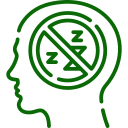
INSOMNIA
Insomnia can be a trying condition to live with. It refers to problems falling and remaining asleep over an extended period of time. Difficulty going off shift at night or getting up in the middle of the day might make you feel drained and irritable as a result of these disruptions to your regular routine. TMS treatment has been utilized to help individuals with sleep issues or disorders.

POSTPARTUM DEPRESSION
PPD is one of the most severe mental illnesses. It affects 1 in 10 women after childbirth, and postpartum depression can be a difficult and distressing period for new moms. The symptoms commonly include feelings of worthlessness or excessive guilt, making ordinary activities seem impossible to accomplish at times even getting out of bed each morning might be too difficult. Repetitive TMS therapy sessions or rTMS may help alleviate your depression quickly.

POST-TRAUMATIC STRESS DISORDER
PTSD is a mental illness that emerges following frightening events. Flashbacks, nightmares, sleeping difficulties, and anxiety or sadness are all common symptoms. TMS therapy improves linkages between the prefrontal cortex and the brain region involved with emotional control, such as the amygdala, which reduces PTSD severity levels.
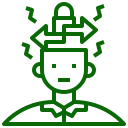
OBSESSIVE-COMPULSIVE DISORDER
Obsessive-compulsive disorder (OCD) affects one in every five people. According to studies, genetics may predispose someone to this problem, but there may also be a communication gap between various parts of the brain, particularly those concerned with judgment making skills or emotion regulation abilities (both in the frontal lobe). TMS can be a viable treatment option to help relieve the debilitating symptoms associated with OCD.

SMOKING CESSATION AND MORE
TMS therapy is designed to help people quit smoking and drug addiction by correcting the brain's faulty or detrimental behaviors that have developed over time. The prefrontal cortex, nucleus accumbens, and ventral tegmental area (VTA) are all targets of TMS treatment.
By targeting certain brain regions when they are in need of a cigarette transcranial magnetic stimulation has been found to significantly improve the success rate of quitting smoking.


